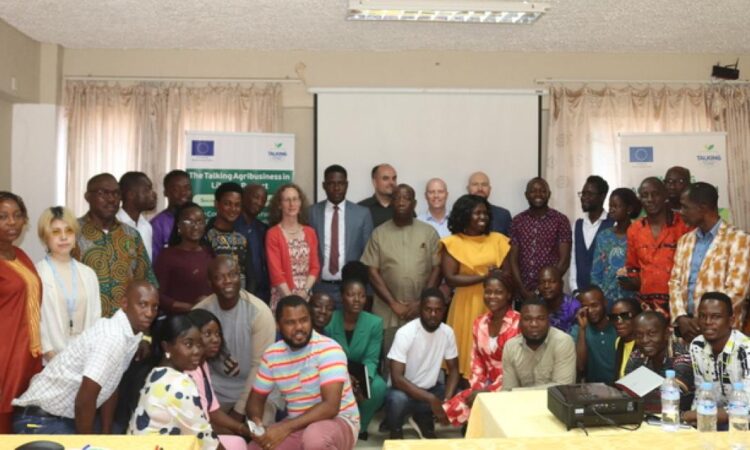
— 46 out of the 54 countries that signed up to the AfCFTA have ratified, Liberia not included.
Stakeholders from the private and public sectors have exchanged ideas or brainstormed on how Liberia can ratify the Africa Continental Free Trade Area (AFCTA) agreement to enhance better trade for the agribusiness sector of the country.
AfCFTA is an agreement among 54 African countries for the creation of a single continental market for goods and services in addition to the free movement of persons, labour and investment geared towards a customs union.
Its purpose is to expand intra-African trade through harmonised and well-coordinated trade facilitation regimes. It further aims to harmonise trade instruments across the Regional Economic Communities (RECs).
Presenting the research findings at the event, Maame Kyerewaa Brobbey, project lead and Cerath Development Organization’s Senior Development Specialist, said that 46 out of the 54 countries that signed up to the AfCFTA have ratified.
But Brobbey said Liberia is one of few countries that have not ratified the agreement. The research findings were released during the Talking Agribusiness in Liberia second communication event held last week in Monrovia.
The event, which was implemented by the Cerath Development Organization, funded by the EU, brought together farmers, the private sector members, donor partners and officials of the Liberian government.
It was aimed at providing a platform for learning, exchange of ideas, and facilitating discussions on Liberia’s AfCFTA ratification process and the involvement of private agribusiness sector actors in AfCFTA in Liberia.
According to the Cerath development specialist, the research findings revealed further that while Liberia has a technical working group for the ratification and implementation of the agreement headed by the Ministry of Commerce and Industry, there has not been any specified engagement with Liberia’s private agribusiness sector in the formal processes and activities related to AfCFTA.
She however mentioned that the government actors have engaged different apex business entities on the AfCTA to differing degrees.
“The research notes that the favourable steps toward the implementation of the agreement will include finalising the national ratification and implementation strategy and carry out extensive stakeholder engagement,” she stated.
The research findings indicate that Liberia needs to strengthen institutional structures and ensure national coordination of the agreement. It also noted that Liberia needs to beef-up awareness efforts of the provisions in the agreement to the private sector and determine how the sector benefits from the agreement.
Welcoming the stakeholders at the event, CERATH Development Organization’s Country Director, Leroy Kanmoh, said the event seeks to disseminate information gathered on Liberia’s progress towards the ratification of the African Continental Free Trade Area agreement.
Kanmoh noted that AfCFTA presents significant opportunities for Liberia and that the country’s ability to industrialise and stimulate an export-driven economy in the light of the AfCFTA is critical.
James Dobor Na Kulah Sao, Sr., Assistant Minister for Economic Management at the Ministry of Finance and Development Planning (MFDP), said Liberia has signed up to the ECOWAS protocols on trade.
He noted that AfCFTA will be an expansion of trade at the continental level.
Sao expressed the commitment of the MFDP to support efforts leading not only to the passage of the agreement but the full implementation.
“In order for agribusinesses to be prepared, they need to take advantage of the Ministry of Agriculture’s projects that support agribusiness expansion and development,” he said.
Also speaking, the head of cooperation of the European Union Delegation to Liberia, Jeroen Witkamp said the European Union is looking at the Africa Continental Free Trade Area Agreement with a lot of keen interest.
Witkamp said the EU looks forward to a time when the free movement of persons and services will be fully implemented in AfCFTA countries, noting that the EU is happy to share its experience.
He stated further that trade and the creation of sustainable jobs are the best engines for economic development in any nation, noting that the EU through the Cassava Transformation Project (CASTRAP) is supporting agribusinesses and the National Standards Laboratory, as its way of getting the sector ready for the AfCFTA implementation once passed into law.
For his part, Peter Somah, Assistant Minister for Commerce and Industry indicated that he fully supports efforts that seek to improve the agribusiness sector of Liberia.
Somah said the Ministry of Commerce and Industry is working on supporting the National Legislature with the needed expert knowledge for the passage of the agreement.
The Commerce and Industry Assistant Minister noted that the ministry, through the Liberia Investment, Finance and Trade (LIFT) project funded by the World Bank and implemented by the ministry, will improve Liberia’s investment climate and trade for both agribusinesses and other sectors.
Somah noted that AfCFTA will help provide a market for Liberia-made products and bring about competition.






